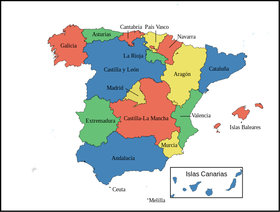Even during the lockdown: Many are working on fragmentation of Spain
Education policy as an amplifier of extreme nationalism
July 28, 2020
Nationalism is neither good nor bad in itself. After the period of aristocratic rule, it is an instrument of freedom and enlightenment. In so far as democratic development has taken place, the state can guarantee the protection of freedoms through legislation, but it can also guarantee occupational safety, climate protection etc. Unfortunately, nationalism is and has been misused for senseless wars of nations against each other.
On the one hand, most global corporations no longer want states and borders. National protection laws only bother them. On the other hand, there are also forces in Spain that want to tear the state apart from within in favour of small regional „lords“. although here, as in the whole of the EU, there are no peoples that are oppressed within their national territory.
The education policy in Spain is an example of how the youth have been manipulated in this sense. Dr. Antonio Jimeno, President of the teachers' union AMES, draws attention to this in an essay that we have translated here.
How to destroy a state with education policy
In 1990 the PSOE passed an education law called LOGSE, which significantly worsened our education system. Although it extended compulsory education to the age of 16, which was fine since that is the minimum age for entering the world of work, it did so in the worst possible way, since it established that all students should be together in the same classroom and learning the same things up to that age, instead of allowing them to choose different routes according to their abilities and interests.Footnotes
So that everyone could move on to the next course, the criteria for promotion were changed, comprensivity was imposed as the only pedagogical theory in the country, and pressure was put on teachers who wanted to take into account the students' qualifications, as this produced too many suspensions[1], according to the Autonomous Councils of Education. The teachers protested but it was no use, they had to choose between accepting the LOGSE or leaving the profession and logically they accepted it.
Although many politicians and journalists continue to say that after the LOGSE there have been many other laws and in theory this is true, in practice we teachers continue with the same model that was established by the LOGSE, since the following law, the LOCE of the PP, was not applied, and what came later, the LOE of the PSOE, changed very few things, as was to be expected being from the same political party, and the one that came later, the law LOMCE of the PP, whose great novelty was the establishment of external evaluations with academic value at the end of Primary and at the end of Secondary, was frozen and such evaluations were never carried out. In short, we have been following the same educational model established by the LOGSE for thirty years.
Now the PSOE is preparing a new law, the LOMLOE or Celaá's [2] law, which follows the model of the LOGSE, accentuating its defects since it does not contemplate making external evaluations at the end of each stage, tests that today are essential to prevent the partisan political indoctrination that is carried out in several Autonomous Communities, it intends to allow the ESO[3] degree to be given even if the students have many failed subjects (Article 28) and the Bachillerato degree even if one subject is failed (Article 37), leaves to the Autonomous Communities the decisions on the use or not of Spanish or Castilian as a vehicular language (new additional provision thirty-eighth, point 4), and will allow that in the school-centres that wish to do so, don't teach the established subjects, but are replaced by activities decided by the local school-centres will be carried out and the grades that they consider appropriate will be given. A set of changes that will reduce the incentive for students to make more effort to pass, and that will make it difficult for parents to know whether their children are really learning or wasting their time.
There are still teachers who, faced with the evident errors of the future Celaá law, write conscientious articles trying to convince the Ministry not to commit these errors. They don't understand how neither the Ministry nor the Education counsellors of the different Autonomous Communities see it. The reality is that these well-meaning education experts do not understand what is happening because they have not realized that the objective of this future law is not educational but political.
It is a question of encouraging and facilitating a change of State, of moving from a State in which the Ministry of Education supervises what is taught in the school-centres and, in this way, can guarantee families the real knowledge acquired by their children, to a State in which this function is left in the hands of the Autonomous Communities, so that they can do what they want, which are logically delighted, because in this way they do not run the risk of looking poorly in front of the other Autonomous Communities. With this great reduction of functions, the Ministry of Education becomes unnecessary, and this is its great contribution to the process of breaking the Spanish nation, the current State. If other ministries are also made unnecessary, the objective can finally be achieved, which is to show that there is no longer any need for a central government, because it no longer has anything to do.
Let's imagine that the previous hypothesis was true, that you are the minister of education and that you want to contribute from your ministry to break up your country. What would you do? Well, you should make a new education law that would facilitate it. If your country had a common language that was spoken everywhere, your law would allow regional authorities to ban its use in schools and make the use of the regional language compulsory. Secondly, your law would allow the common history of the country to be explained differently in each region, each one emphasizing the damage that the central government of the state has caused in that region over the centuries. Since a country differs from another country basically in its language and in the way it tells its history, in a few years, with only the two previous measures, as many societies with different national identities as there are regions would be generated.
For the above process to be possible, it is necessary that the law does not contemplate the possibility of carrying out evaluations common to all regions, since the students have studied different languages and different historical concepts, such an evaluation would show what is being done. Furthermore, in order to ensure that all pupils are educated in regional political ideology in the time allotted, it is necessary for the school environment to be relaxed and comfortable, and so the law should facilitate passing to the next course and obtain the final degree of the studies, even if the student has some subjects not passed. Does all this remind you of a similar situation? Well that's exactly what happens now.
Perhaps it is not by chance that the same year that the law LOGSE was approved, 1990, was also the year in which, in the newspaper „El Periódico“ of Catalonia, Jordi Pujol's 2000 programme was published, detailing the social engineering programme to be applied, to achieve a society that only felt Catalan. Nor is it perhaps coincidental that the PSOE always had the support of the nationalist parties and the class unions[4] in drawing up its educational laws, while the PP always had to pass its educational laws alone, thanks to its absolute majority. Nor is it perhaps so far-fetched to hypothesize that some parties are using education to win future voters, rather than as a service to society, as demonstrated by the fact that they are currently trying to break the agreement with the private schools, consisting of paying their teachers in exchange for the fact that these private schools are also free [5] and of eliminating the subject of religion, without offering to replace it with a history of religions or a religious culture.
This shows that the Ministry is not trying to make a State pact to give stability to the education system, but to impose its ideas and achieve a new model of State[6] in the shortest possible time, taking advantage of the fact that the restrictions as a result of the Covid-19 reduces parliamentary discussions and time. The Ministry of Education has already been asked for a great pact for education, so we will soon know if the hypothesis of destruction of the Spanish State from within is true or not.
[1] Suspension means, a student may not advance to the next course
[2] Isabel Celaá is Spanish minister of education
[3] ESO = Educación Secundaria Obligatoria = from age 12 to 16
[4] Class unions mean left wing unions
[5] In Spain appr. 2/3 of the schools are public and appr. 1/3 are private within the most being "concertado", meaning directed by private ideology and the teaching staff paid by the State
[6] e.g. a kind of confederation of Iberian republics
| | | | Click here to subscribe or cancel your subscription |
Myths and deceptions of Catalan nationalism

Here you'll find the translation
The strategy of recatalanization
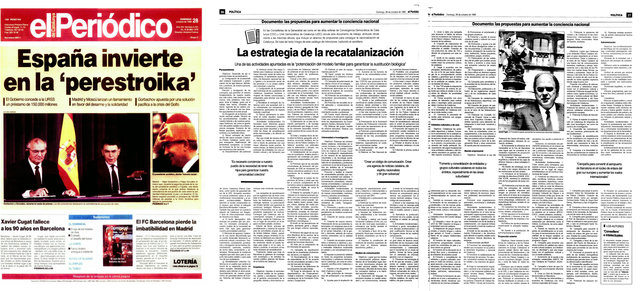 1980 the Spanish journal "El Periodico" published a secret document about the strategy of the Catalan government. It shows in a frightening way the actual spiritual world of the separatist leaders.
1980 the Spanish journal "El Periodico" published a secret document about the strategy of the Catalan government. It shows in a frightening way the actual spiritual world of the separatist leaders.Now it is available in english translation.
Pancatalanism
the separatist's imperial claim
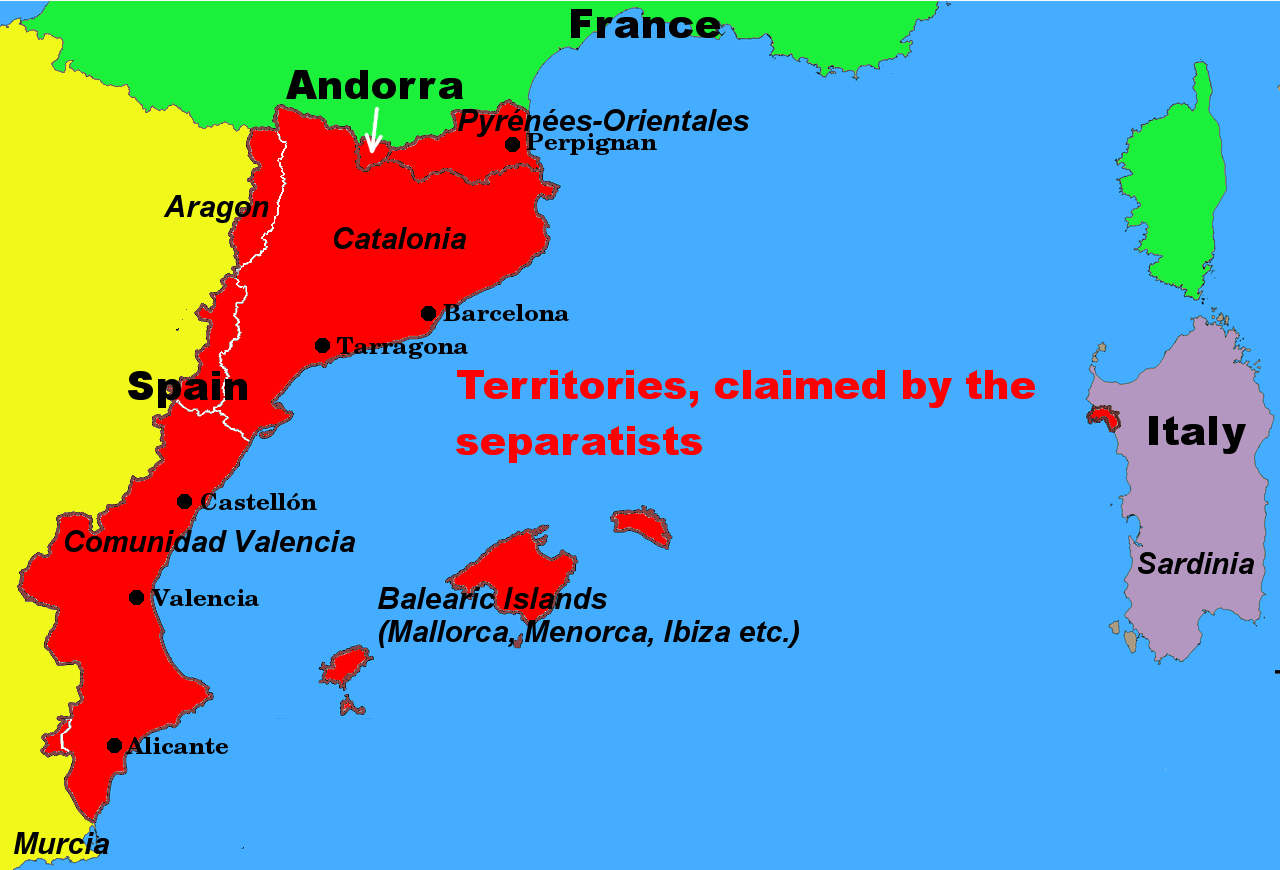 The Catalan government exports the conflict into communities with Catalan population, supporting all efforts of the separatists including financial means to destroy Spain.
The Catalan government exports the conflict into communities with Catalan population, supporting all efforts of the separatists including financial means to destroy Spain. An important tool is the establishment of a language dictatorship that is not afraid to use the same means as Franco.
Separatist indoctrination

Click here to read the study
Language imposition and democracy
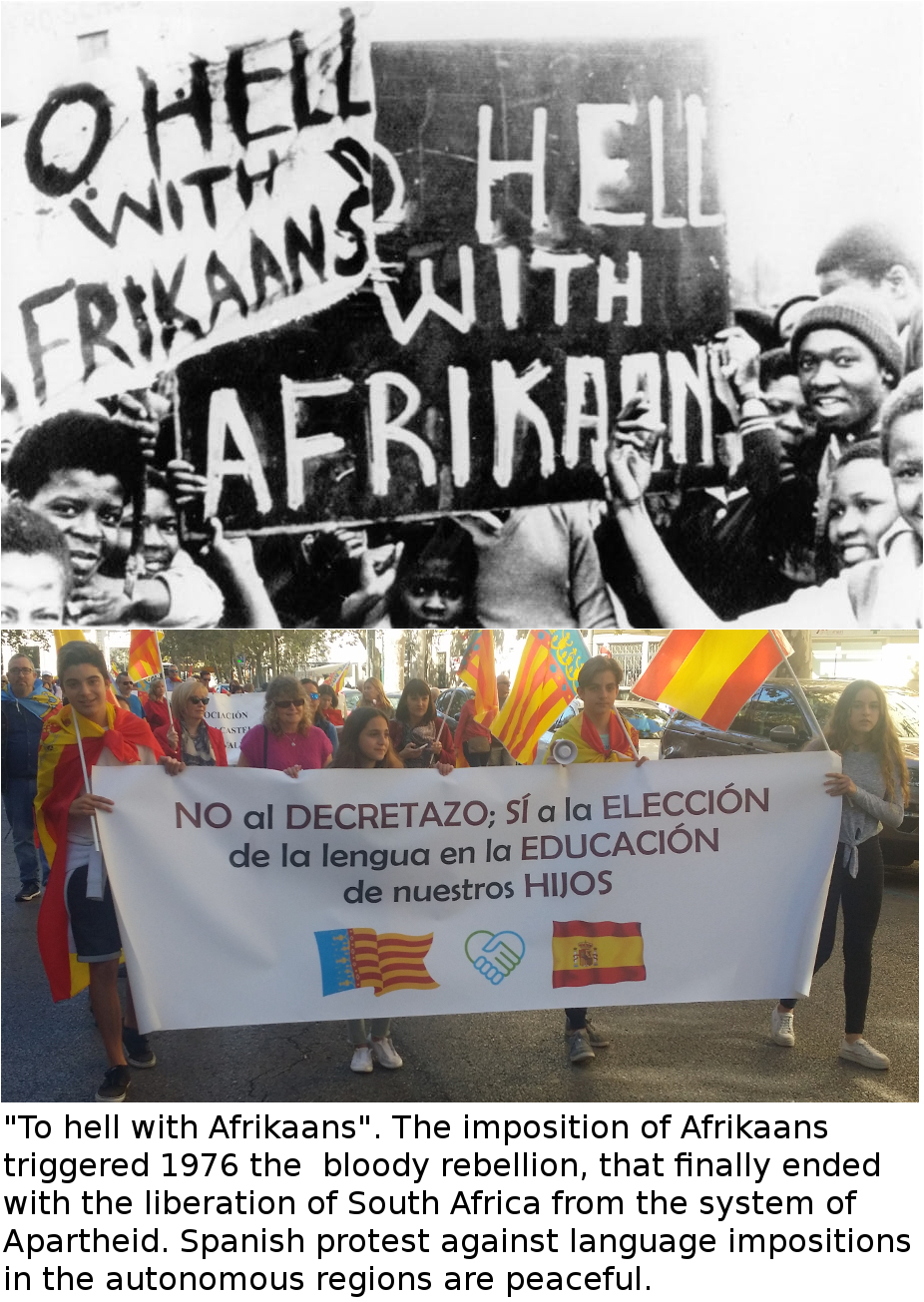
An essay in 6 parts on the potentially violent effect of language imposition containing contributions from South Africa, Catalonia, Ukraine and France.
go to part 1
Publications
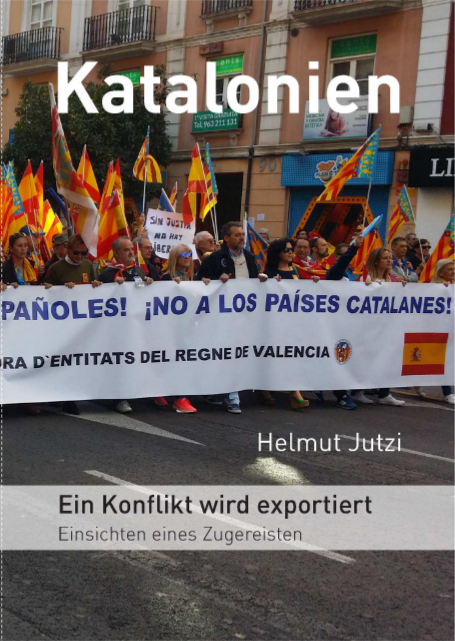 The title says: "Catalonia, a conflict is exported. Insights of a migrant"
The title says: "Catalonia, a conflict is exported. Insights of a migrant"Sorry, up to now, this book is only available in German. However, drop us a line, if you are interested to learn more Contact.
